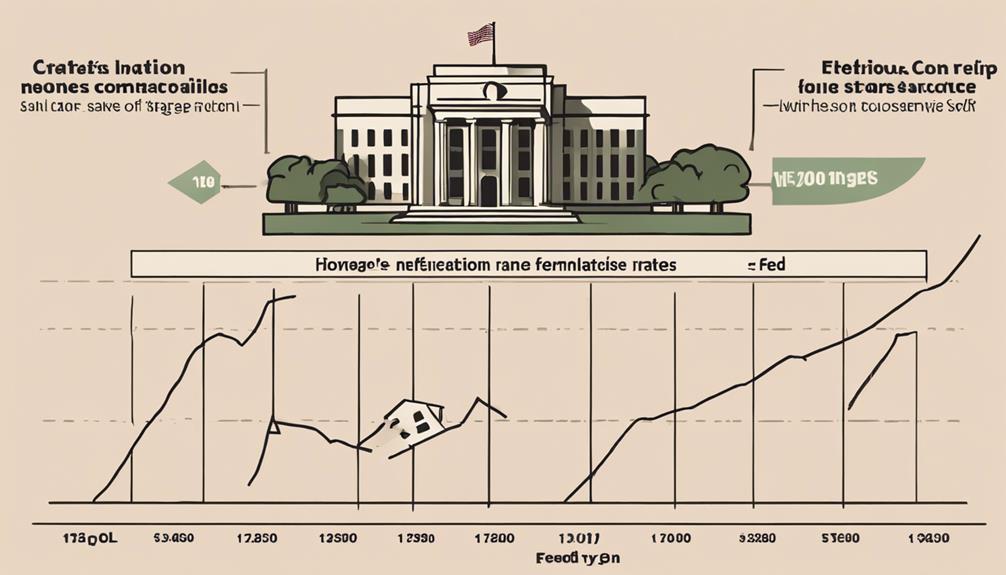Picture this: a tranquil street lined with homes bathed in sunlight, where well-qualified borrowers are securing mortgage rates that seem almost too good to be true. But why are these individuals, like yourself, experiencing such favorable terms?
The answer lies in a combination of factors that can significantly impact the interest rates you are offered on your home loan. Stay tuned to discover the key elements that could potentially save you thousands of dollars over the life of your mortgage.
Factors Influencing Lower Mortgage Rates
When looking for lower mortgage rates, understanding the key factors influencing them can help you secure a better deal. One crucial factor is the current state of the economy. In times of economic growth, interest rates tend to rise, while during economic downturns, rates typically decrease to stimulate borrowing.
Another significant factor is the loan-to-value ratio (LTV) of the mortgage. Lenders often offer lower rates to borrowers with a lower LTV ratio, as it represents less risk for them.
Additionally, your debt-to-income ratio plays a vital role. Lenders prefer borrowers with a lower ratio, as it shows you have a better ability to manage your current and potential future debt obligations.
Importance of Strong Credit Profiles
To secure low mortgage rates, having a strong credit profile is key. Lenders heavily consider your credit score when determining the interest rate you qualify for. A high credit score signals to lenders that you’re a responsible borrower, which can result in lower interest rates.
A strong credit profile not only helps you secure better rates but also gives you more negotiating power with lenders. Maintaining a good credit history by making timely payments, keeping credit card balances low, and avoiding opening multiple new accounts can all contribute to a stronger credit profile.
How Stable Finances Impact Rates
When it comes to mortgage rates, your stable finances play a crucial role. Lenders prefer borrowers with reliable income sources and substantial savings, as these factors often lead to lower interest rates.
Financial Stability Equals Lower Rates
Financially stable borrowers typically enjoy lower mortgage rates due to their reduced risk profile in the eyes of lenders. When your finances are stable, with a healthy credit score and manageable debt-to-income ratio, lenders see you as a reliable borrower. This reduced risk of default means lenders are more willing to offer you lower interest rates on your mortgage.
Reliable Income Lowers Rates
With a reliable income, borrowers can secure lower mortgage rates due to their reduced risk profile in the eyes of lenders. Lenders view a stable income as a strong indicator that you can consistently meet your mortgage obligations. When you have a reliable source of income, lenders are more confident in your ability to make timely payments, which reduces the overall risk associated with lending to you.
This decreased risk often translates into lower interest rates on your mortgage loan. Demonstrating a steady income stream through pay stubs, tax returns, or employment verification can help you qualify for better rates. So, keep building on your stable financial foundation to access the most favorable mortgage rates available.
Savings Impact on Rates
To secure favorable mortgage rates, the stability of your savings plays a crucial role in demonstrating your financial reliability to lenders. Lenders consider your savings as a cushion that can help you make mortgage payments in case of financial emergencies or unexpected expenses.
Having a substantial amount in savings indicates to lenders that you’re financially responsible and capable of handling mortgage obligations. Moreover, a healthy savings account can also provide you with the confidence and peace of mind that you have a financial safety net in place.
Strategies for Securing Lower Rates
When aiming for lower mortgage rates, consider comparing rates from different lenders and employing effective negotiation techniques. These two key strategies can help you secure a more favorable rate for your mortgage.
Rate Comparison Tips
Compare mortgage rates from different lenders to identify the most competitive options for securing lower rates. Start by researching online or contacting local banks, credit unions, and mortgage brokers.
Request loan estimates from multiple lenders to compare interest rates, APRs, and closing costs. Keep in mind that some lenders may offer lower rates with higher upfront fees, so consider the overall cost over the life of the loan. Look for special programs or promotions that could further reduce your rate.
Additionally, check if you qualify for any discounts based on your credit score, down payment amount, or existing accounts with the lender. By comparing rates and exploring your options, you can better position yourself to secure a lower mortgage rate.
Negotiation Techniques
When exploring negotiation techniques to secure lower mortgage rates, consider highlighting your strengths as a borrower to leverage towards better terms. Start by emphasizing your excellent credit score, stable employment history, and manageable debt-to-income ratio. These factors demonstrate your reliability and financial stability to lenders, making you an attractive candidate for lower rates.
Another effective strategy is to shop around and compare offers from multiple lenders. Armed with this information, you can negotiate with confidence, pointing out competing offers to leverage better terms. Additionally, consider paying points upfront to lower your interest rate over the life of the loan.
Benefits for Well-Qualified Borrowers
For well-qualified borrowers, low mortgage rates offer significant financial advantages. When you have a strong credit score and a stable income, lenders are more willing to offer you lower interest rates on your mortgage. This means lower monthly payments, saving you money over the life of your loan. With lower rates, you can potentially afford a more expensive home or pay off your mortgage sooner.
Additionally, the total amount of interest you pay over the loan term decreases, leaving you with more money in your pocket. Being a well-qualified borrower not only opens doors to better loan terms but also provides you with the opportunity to build more wealth through homeownership.
Maximizing Savings on Home Financing
To make the most of your home financing and maximize your savings, consider exploring different loan options tailored to your financial situation.
Start by comparing interest rates and fees from various lenders. Even a slight difference in interest rates can translate into significant savings over the life of your loan.
Look into adjustable-rate mortgages if you plan to move or refinance in the near future, as they often offer lower initial rates.
Additionally, consider making a larger down payment to reduce your loan amount and potentially secure a lower interest rate.
Remember to shop around and negotiate with lenders to find the best terms that suit your needs and help you save money in the long run.
Conclusion
So, if you’re a well-qualified borrower with a strong credit profile and stable finances, you’re in luck! By taking advantage of the current low mortgage rates, you can save a significant amount of money on your home financing.
So don’t wait, start exploring your options and see how you can maximize your savings today!




